FW
Spanish fashion label Desigual has launched a winter collection that’s made from waste and recycled raw materials in collaboration with Ecoalf. The collection is designed on the concept of reuse, reinterpret, rethink, relove and features outerwear, jackets, lightweight trainers and bags. The short and long padded jackets made from 100 per cent recycled nylon (and also 100 per cent vegan) are devoid of any materials of animal origin. The lightweight trainers are made from recycled polyester from plastic bottles. Similarly, the first two-in-one reversible beanie designed by Ecoalf for Desigual is made from recycled materials using 20 per cent less water consumption, 50 per cent less energy and 60 per cent less CO2 emissions.
Desigual offers clothing for women, men, and children as well as a collection of unique accessories. The brand’s clothing exudes a character that is unique, which helps people express themselves and be the most authentic. Desigual’s characteristic vibrant designs come with a flamboyant splash of colors. Ecoalf was born in 2009. The idea was to create a fashion brand that is truly sustainable. By integrating breakthrough technology it creates clothing and accessories made entirely from recycled materials.
Alliances between fashion industry companies are integral to continued progress towards a model that facilitates sustainable fashion manufacturing.
"Though a strong consumer base adds vibrancy to the US economy, the ongoing trade war with China makes its future uncertain as businesses in the country struggle to make crucial investment and hiring decisions. The US recently threatened to retaliate against the higher tariffs levied by China. However, it is the one most affected by these tariffs."
 Though a strong consumer base adds vibrancy to the US economy, the ongoing trade war with China makes its future uncertain as businesses in the country struggle to make crucial investment and hiring decisions.
Though a strong consumer base adds vibrancy to the US economy, the ongoing trade war with China makes its future uncertain as businesses in the country struggle to make crucial investment and hiring decisions.
The US recently threatened to retaliate against the higher tariffs levied by China. However, it is the one most affected by these tariffs. As ‘Tariffs Hurt the Heartland’, a campaign group with more than 150 trade groups that oppose tariffs reveals, Since the beginning of the trade war, US consumers and businesses have paid an extra $42 billion due to increased tariffs. Many companies are paying millions of dollars in tariffs since September to keep consumers from bearing the cost. To avoid such losses in future, companies have diverted expansion plans from the US to Europe.
Investments on the decline
Investments in the US declined for the second straight quarter in July through September as the trade war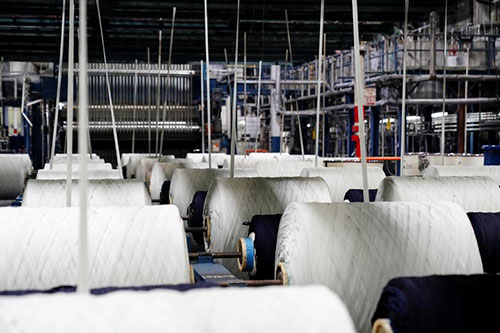 eroded confidence. Manufacturing also contracted for fourth consecutive month in November as orders declined. Mount Vernon Mills, a South Carolina-based manufacturer of apparel fabrics, which had planned to buy new automation equipment deferred its investment plan due to the uncertainty about congressional passage of a new US-Mexico-Canada trade deal. The private company, founded in 1847, produces 75 million yards of denim and other fabrics each year, much of it in the rural towns of Trion and Alto, Georgia. Most of its apparels are sewn in Mexico are shipped back to the US for sale.
eroded confidence. Manufacturing also contracted for fourth consecutive month in November as orders declined. Mount Vernon Mills, a South Carolina-based manufacturer of apparel fabrics, which had planned to buy new automation equipment deferred its investment plan due to the uncertainty about congressional passage of a new US-Mexico-Canada trade deal. The private company, founded in 1847, produces 75 million yards of denim and other fabrics each year, much of it in the rural towns of Trion and Alto, Georgia. Most of its apparels are sewn in Mexico are shipped back to the US for sale.
One of the company’s biggest customers the North Carolina-based Kontoor Brands, believes the price of Wrangler and Lee jeans that it produces in Mexico could rise by $10 to $15 if Trump cancels the current North American Free Trade Agreement and the US Congress fails to pass the replacement accord. This would compel the company to shift its production from Latin America to Asia and elsewhere, a move that would pose huge challenges for his firm. Therefore, it is important for the US Congress to adopt the USMCA agreement as it will encourage these companies to continue investing in the US.
US companies defer expansion plans to cut losses
US-based companies are putting off expansion plans. For example, Italian cheesemaker Auricchio SpA based in West Caldwell, New Jersey has deferred its plans to buy two cheese-cutting and wrapping machines as the company is not sure how long tariffs on Italian cheese will last and whether they could go higher. Another company that has deferred its expansion plans is Dan Digre, a Minnesota-based audio equipment maker has paid hundreds of thousands of dollars in tariffs on Chinese parts since September 2018, instead of using the money to launch a new line of higher-end speakers that would have boosted its sales besides generating 20 more jobs at its plant.
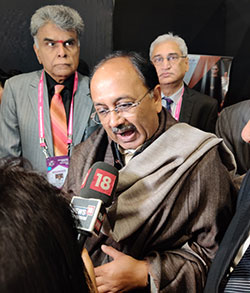 A BIRD'S EYE VIEW OF THE EVENT
A BIRD'S EYE VIEW OF THE EVENT
India International Garment Fair (IIGF) is a specialized bi-annual fair. The fair for Autumn/Winter season is organised in the month of January and for Spring/Summer season, fair is organised in the month of July, every year. IIGF has been globally recognized as one of the leading fairs for the Indian Garment Export Industry and is one of the Asia’s biggest apparel fair.
This business platform serves to Indian exporter’s fraternity and fulfills meeting sourcing requirements of major global buyers in Ready-made Garments & Fashion Accessories.
This being 64th in the series is currently been held on 20-22 January, 2020 at Pragati Maidan, New Delhi, India. The exhibitors are showcasing their Autumn/Winter-2020-2021 collections during three days of the fair. The display product cover head-to-toe fashion, high quality fashion wears covering Women’s wear, menswear, kids wear, accessories amongst supply chain players.
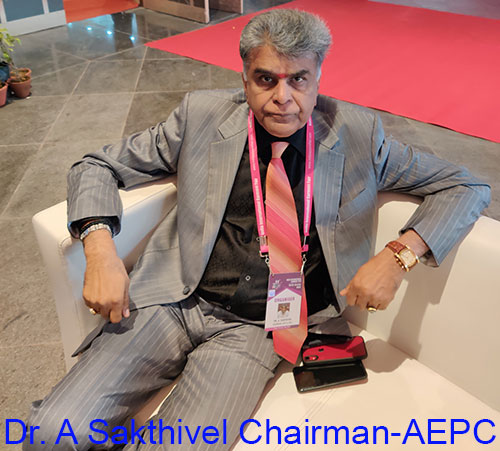
This fair has already carved a unique niche within the global ready made garment fairs. Despite of challenging global economic conditions fair has kick-started on a positive note. Day one had a fairly good number of committed buyers visiting and showing their reaffirmed faith in India as in a serious apparel sourcing destination
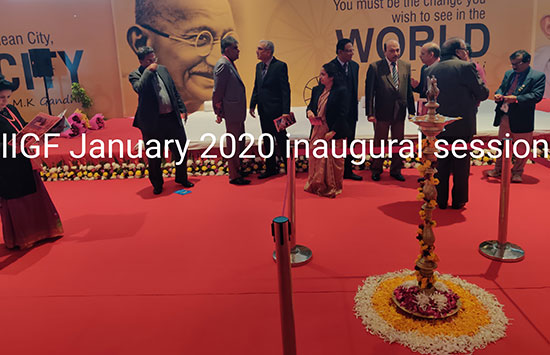
The fair is happening in an all new international venue which is adding a lot of intrigue and excitement amongst buyers and sellers community. Despite of day one being a very cold day the business mood was very optimistic and we look forward to three successful days.
Excerpts of the chief guest Shri Sidharth Nath Singh, MSME Minister UP interaction
He emphatically said that the favourable government policies are going to show up positive results in 2020. Therefore we can expect a gradual turnaround in coming months and quarters especially I am staying optimistic about Textiles / Apparel sector; which has latent potential to bounce back & will surely come up to the administration unstinted belief in this segment as in a big job creator & economic multiplier. Also we very positively looking forward to upcoming union budget to give economy a positive impetus and a decisive direction. All the very best to IIGF and this trade for good showing.
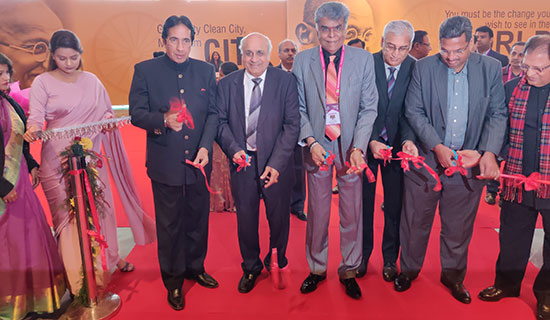
The current 64th edition of the India International Garment Fair (IIGF) achieves another important milestone as it completes over three decades of operation as a world-class business platform for Indian exporters.
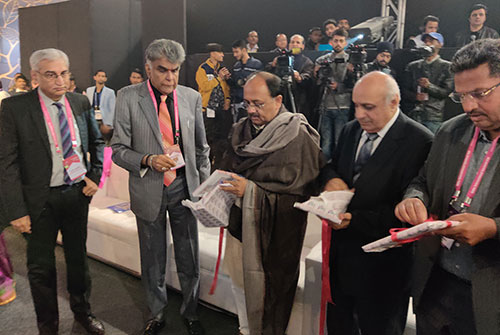
The Lenzing Group, world market leader for wood-based cellulosic fibers, and Duratex, the largest producer of industrialised wood panels in the southern hemisphere, plan to build a 500,000 tonne dissolving wood pulp plant near Sao Paulo in Brazil. The start-up is planned for the first half of 2022. In the joint venture, Lenzing holds a 51 percent, Duratex a 49 percent stake.
The project will be financed through long-term debt. The corresponding financing contracts are expected tobe concluded at the end of the first quarter of 2020.Key milestone to structurally strengthen cost leadership position. The new dissolving wood pulp plant strengthens the Lenzing Group’s backward integration and cost position aswell as its specialty fiber growth in line with its sCore TEN corporate strategy. The single-line dissolving productionfacility of its kind. Dissolving wood pulp is a key raw material required for manufacturing Lenzing’s bio-based fibers. The joint venture will supply the entire volume of dissolving wood pulp to the Lenzing Group.“Wood-based cellulosic fibers offer an important contribution to enhance sustainability in the textile industry. Inline with its corporate strategy Core TEN, Lenzing is committed to drive organic growth in this market.
“The trust and support of the main shareholders of Lenzing and Duratex were of great importance forthis key project”, states Stefan Doboczky, CEO of the Lenzing Group. Strong focus on sustainability in planning the new production facility, particular importance was given to sustainability aspects. The joint venture secured FSC-certified plantations1 covering an area of over 44,000 hectares to provide the necessary biomass.
The plantations operate completely in accordance with the guidelines and high standards of the Lenzing Group for sourcing wood and pulp. The plant will operate among the highest productive and energy-efficient in the worldand will feed the 40 percent of excess bioelectricity generated on site as “green energy” into the public grid. With this project, Lenzing sets a milestone in its strategy to carbon neutrality.
Adidas will launch gender-neutral clothing designed by singer Beyonce. This will include jumpsuits, cargo pants, hoodies and cycling shorts. The partnership comes as Adidas seeks to attract more female customers. Adidas does not expect much of an immediate help to sales from the initial Beyonce collection, but it will ramp up over time.
Adidas is celebrating 70 years. As a company Adidas spends three billion euros a year to create brand demand or brand heat. Of that roughly half is against sponsorships, athletes, collaborations with federations and clubs, and the other half is used to activate its innovations. Of the half on athletes and clubs, a lion’s share is still football. Other than that the company invests in basketball, Olympic sports, tennis, and continues to sponsor marathons. But football has defined the brand and major investments in terms of endorsements will continue to be in the football space. Adidas is technically a sports brand and not a fashion brand. But that hardly matters when sports and style have become inseparable and street wear is blending with high fashion. Adidas has benefited from the continued success of athleisure, which has remained a major force shaping clothing today. Adidas is also behind limited-run shoes. These build up its brand prestige while leaving fans wanting more.
Unilever Bangladesh and the Bangladesh Garment Manufacturers and Exporters Association (BGMEA) have signed a memorandum of understanding (MoU) to start an initiative, named ‘Aastha’ (meaning trust),to work together on a number of sustainable development goals (SDGs) to improve the livelihoods of a million apparel workers
Through this partnership, Unilever, the largest fast moving consumer goods company in Bangladesh, intends to bring its brands’ purpose to life while doing genuine good for the society. The partnership will be the first-ever sectoral approach to fast-tracking SDG progress in Bangladesh. It aims to positively impact more than 1 million workers and enhance their overall health and well-being, said the statement.
Four SDGs and six national performance indicators have been identified as the key focus areas of the partnership. Those are: SDG 3 (Ensure good health and promote well-being for all at all ages); SDG 6 (Ensure availability and sustainable management of water and sanitation for all); SDG 12 (Ensure sustainable consumption and production patterns); and SDG 17 (Strengthen the means of implementation and revitalise the global partnership for sustainable development).
In addition, Unilever Bangladesh will make its products available inside factory premises at special prices exclusively for the workers. Unilever Bangladesh also signed independent MoUs with garment factories to improve livelihoods of their workers through different initiatives.
Lindex has teamed up with CottonConnect to train women, especially from Indian tribal regions, on how to shift from conventional farming to organic farming. These women are cotton farmers. They will be educated about organic farming, health, business management and labor rights.
Lindex is a Sweden-based fashion chain. As one of world’s largest buyers of organic cotton, it is working to further increase the supply of organic cotton, while simultaneously continuing the important work of strengthening women. Lindex has production offices in Bangladesh, China, Hong Kong, India, Myanmar and Turkey. These work in close collaboration with design and buying in the development and production of the collections. They also work closely together with Lindex’s suppliers to make sure that the styles that end up in store and online meet the standards when it comes to quality, fit and sustainability. CottonConnect, based in the UK, works on building sustainable supply chains teaching sustainable agriculture practices and developing skills of women in countries where organic supply chains start.
CottonConnect’s partnership with Lindex seeks to transform the organic cotton sector not only by increasing the volumes of organic cotton, and by working with women who are often neglected in training programs, but also by creating a direct link between the farm community and the brand.
Powerlooms, spinning mills, and garment units in Maharashtra get a power subsidy. The release of funds is expected to benefit textile and garment units in the state.
Energy accounts for nearly half the production cost in the textile value chain. While spinning mills across India are struggling to pass on the elevated cotton prices to consumers, textile manufacturers are facing falling exports. The ongoing economic slowdown in the country has lowered the domestic demand of fabric and readymade garments, resulting in a continuous squeeze in profit margins. While export volumes have seen some uptick in recent months, they remain lower than the levels seen in the preceding fiscal year. Both volumes and realisations have come under pressure in the first half of fiscal ’20 due to weak export demand amid increasing competition from other producing countries and sluggishness in domestic consumption levels. Higher domestic raw material cost, with Indian cotton prices trading at a premium to international cotton, have also contributed to the loss of export competitiveness. Domestic spinners expect performance in fiscal ’20 will be affected by tepid volumes and weak earnings in the first half of the financial year. This is the likely scenario even though the industry is recovering from the slowdown.
If nothing else, 2019 has been the year in which sustainability has been the keyword for both consumers and businesses. But while progress is being made in some areas, there’s still work to be done. Improvements in design and manufacture continue to have a positive effect in making clothes in a more sustainable fashion, but too much fashion is being thrown away and ending up in landfill.
The water target has been achieved ahead of 2020, with a reduction of more than 18 per cent against the 15 per cent target. Cotton sourced from Better Cotton Initiative (BCI) suppliers has been a large contributor to this. The Waste and Resources Action Program (WRAP) is confident that the 15 per cent target for a reduction in carbon will also be met. This is due to several factors including changes in the proportions of different fibers used, and increased use of sustainable forms of cotton.
But progress is less encouraging in some other areas. As far as whole chain waste is concerned, reduction continues at a slower pace with a 1.4 per cent improvement against baseline. Supply chain transparency is improving. However, more work is needed, and WRAP is working with signatories to try to improve this.
Renowned international winter sports and fashion brands use Sympatex membrane. This includes ski and outdoor brands. The membrane is 100 per cent recyclable and climate-neutral.
Sympatex, based in Germany, is a functional apparel specialist. As one of the world’s leading producers, Sympatex Technologies has been synonym for high-tech functional materials in clothing, footwear, accessories and technical fields of application since 1986. Together with selected partners, Sympatex develops, produces and distributes membranes, laminates and functional textiles as well as finished products worldwide. The Sympatex membrane is highly breathable, 100 per cent wind- and waterproof and regulates the climate. It is 100 per cent recyclable, climate-neutral, Bluesign certified, and it received the Oeko-Tex-Standard 100 certificate. Sympatex will kick-off many new ski, snowboard and fashion partnerships in preparation for the 2020-2021 winter season. For the 2020-2021 winter season, glove specialist Roeckl Sports will introduce its brand-new Eco Series featuring 100 per cent recyclable and climate-neutral, non-PTFE/non-PFC membranes from Sympatex. The launch will encompass six ski glove models, two each for women, men and children, with a design that conserves resources wherever possible. The six models boast a high percentage of recycled or recyclable materials and contain no PFCs – all without sacrificing superior performance.












